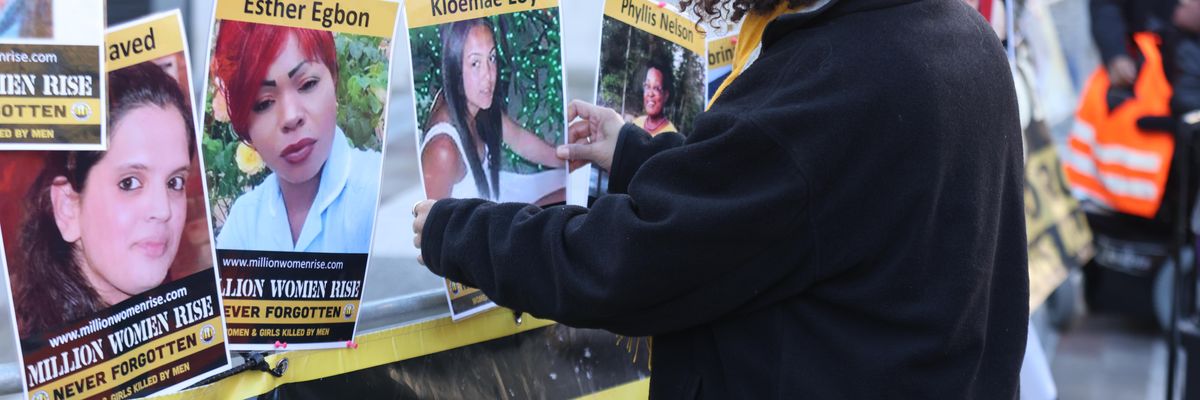Leaders at the United Nations and civil society groups marked the International Day for the Elimination of Violence Against Women on Thursday to highlight the global scourge of gender-based violence that has escalated during the last 20 months of the Covid-19 pandemic and which only focused and urgent action can help bring to an end.
"In all of our own neighborhoods, there are women and girls living in danger."
La Via Campesina, the international peasants rights movement, said in a declaration that global solidarity is key to making sure that violence against women is not only decried and confronted, but eliminated.
In its statement, the group called for people to "organize actions to raise awareness, give visibility, stand in solidarity and denounce the alarming violence experienced by women, children, and LGBTQIA* people worldwide; a violence that has only worsened with the Covid-19 pandemic."
"Today," the group added, "societies require public policies that guarantees their rights and a dignified life for women and communities. These multiple forms of violence impact more than half of the world's population and cannot be ignored. We call on everyone, from each territory, to continue steadfast in the struggle to STOP all violence against women, against gender non-conforming people, and against the working class."
Making the connection between the fight against gender-based violence and the battle for a more livable planet, climate-focused groups like Friends of the Earth International and Greenpeace said one issue cannot be addressed without the other.
"The climate crisis and environmental degradation are fueling gender-based violence," wrote Heleni Smuha, a Greenpeace organizer based in Brussels, on Thursday. "Women and gender minorities at the forefront of environmental resistance movements are a prime target of violence. They are threatened, intimidated, attacked, or killed while defending their homes, communities, land, livelihoods, and ecosystems vital for biodiversity and the climate."
On the International Day Against Violence Against Women and Gender Minorities, added Smuha, "we want to recognize this scourge and stress once more that there can be no climate justice without gender justice."
Campaigners in the U.K. led by Million Women Rise held a rally and vigil outside Scotland Yard in London to remember those women killed by men and other victims of gender-based violence worldwide as they noted the start of over two weeks of actions designed to combat the crisis.
According to a statement from the group, the 16 days of activism will run from the International Day to Eliminate Violence Against Women on November 25 to the International Day for Human Rights on December 10 during which they and their allies urged "women and girls to participate in a global action to demand an end to the continued, systematic violence against us."
"We're heading for Scotland Yard because we need those who work there to understand that we hold them critically responsible for the ongoing, disastrous failures to protect all women and girls from violence, and that many among their number are actually implicated as abusers," said Sabrina Qureshi, a spokesperson for the group.
In her comments to mark the day, U.N. Women executive director Sima Bahous described gender-based violence as a "global crisis that thrives on other crises."
"Conflict, climate-related natural disasters, food insecurity, and human rights violations all contribute to women and girls living with a sense of danger, even in their own homes, neighborhoods, or communities," said Bahous.
"In all of our own neighborhoods," she added, "there are women and girls living in danger."
On the eve of the international day, UN Women released a new report--titled Measuring the shadow pandemic: Violence against women during COVID-19--which focused on the preexisting violence women face compounded by the deadly outbreak.
Overall, the report found that one in two women report that they or a woman they know have experienced violence since the start of the pandemic. In addition, a survey conducted across 13 countries as part of the report found that 60% of women believe sexual harassment in public spaces has gotten worse since Covid-19 hit. According to a statement by the group:
The findings also revealed that about 1 in 4 women are feeling less safe at home while existing conflict has increased within households since the pandemic started. When women were asked why they felt unsafe at home, they cited physical abuse as one of the reasons (21 percent). Some women specifically reported that they were hurt by other family members (21 percent) or that other women in the household were being hurt (19 percent).
"The Covid-19 pandemic, which necessitated isolation and social distancing, enabled a second, shadow pandemic of violence against women and girls, where they often found themselves in lockdown with their abusers," said Bahous. "Our new data underlines the urgency of concerted efforts to end this."
While the dynamics that drive violence against women are deeply engrained in societies worldwide, U.N. Secretary-General Antonio Guterres was among those who say there is a pathway to a better future.
"Violence against women is not inevitable," Guterres said in a statement. "The right policies and programs bring results. That means comprehensive, long-term strategies that tackle the root causes of violence, protect the rights of women and girls, and promote strong and autonomous women's rights movements. Change is possible, and now is the time to redouble our efforts so that together, we can eliminate violence against women and girls by 2030."
